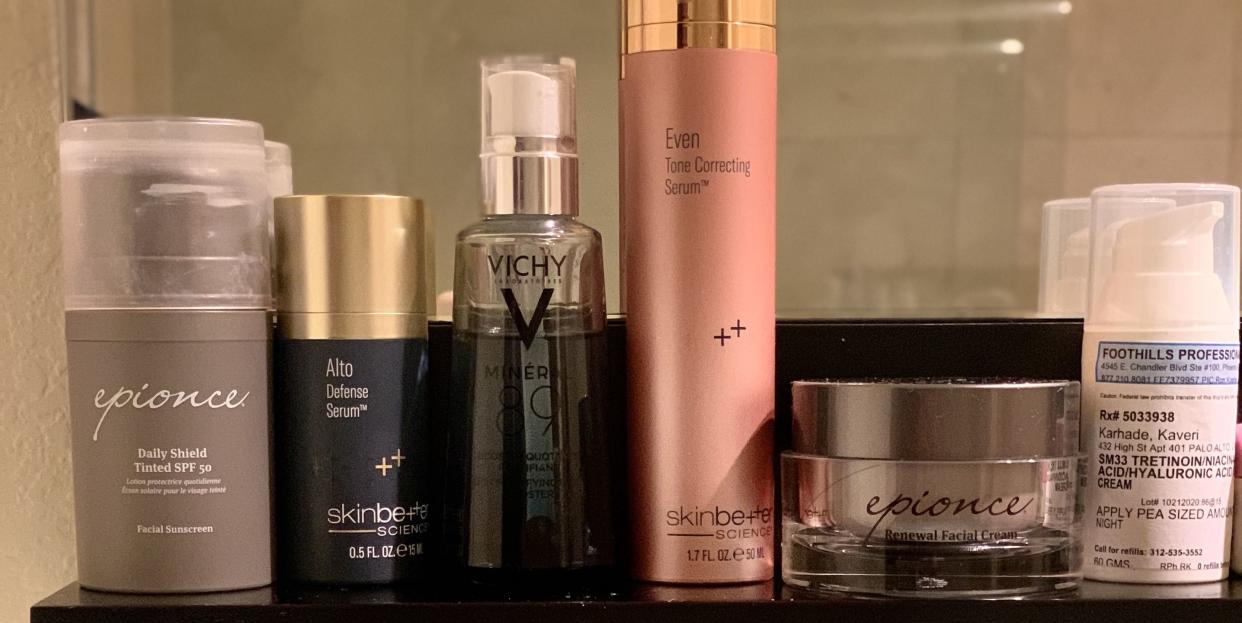‘I’m a Dermatologist With Hyperpigmentation—Here Are 6 Skincare Steps I Follow'

Dermatologists prescribe products to their patients all day long, but have you ever wondered which ones they personally use? Welcome to Derm Diaries, a new series where dermatologists share their skin woes—and solutions—so you can steal secrets from their skincare routines.
Kaveri Karhade, a board-certified medical and cosmetic dermatologist in the San Francisco Bay Area, knows the toll that bad skin—even if just for a day—can take on your mental health. "Having studied both chemistry and anthropology in college, I developed an appreciation for both science and the psychosocial aspect of life," says Dr. Karhade. "In medical school, I quickly realized how much skin conditions can impact a person's quality of life, and it became very rewarding to work on this level to help people regain their confidence."
While Dr. Karhade's naturally tan skin allows her to worry less about sunburns (yes, she still wears sunscreen), she is more prone to brown spots, melasma, and other pigment issues. "When I get acne or any other rashes, it tends to leave post-inflammatory hyperpigmentation (aka brown spots), which is frequently more bothersome than the actual acne itself... This is an issue I've dealt with my entire life," she explains. She's found the best way to combat the hyperpigmentation is to get ahead of it and try not to let the pimple happen in the first place. "Whenever I start to notice breakouts I treat them ASAP. In addition to using a retinoid regularly to prevent breakouts, I treat any inflamed acne bumps right away with a variety of topicals and sometimes procedures to prevent these brown spots." While she tends to switch up her skincare with the seasons, keep reading for several of her tried and true staples.

She alternates her cleansers.
"In general, my morning routine includes cleansing my face with either a gentle cleanser such as Epionce Gentle Foaming Cleanser or Avene Gentle Milk Cleanser, or a medicated cleanser like SkinCeuticals Glycolic Renewal Cleanser. I like the Epionce cleanser because it is mild and effective. The Skinceuticals cleanser contains glycolic acid, an alpha hydroxy acid (AHA) that's helpful for acne-prone skin and to help with brightening. However this can also dry the skin out more, so I like to alternate this with the gentle cleanser so as not to dry my skin out too much."
She believes in the power of an antioxidant serum.
"After patting my face dry, I like to use an antioxidant serum such as SkinCeuticals Phloretin CF or SkinBetter Alto Defense Serum. The SkinCeuticals, which focuses on vitamin C, is a gold standard antioxidant serum because it's formulated to have a longer shelf life than many other competitors. The SkinBetter product actually has over 15 ingredients that act as antioxidants, which makes it a powerful serum!"
"Antioxidant serums help protect against environmental factors such as pollution and UV. I like the analogy of an avocado that tarnishes when cut open but that doesn’t tarnish if you apply lime or lemon (aka vitamin C). I recommend that antioxidant serums not be used at the same time as a retinoid since antioxidants are very sensitive to changes in pH. Since I usually use my retinoid at night, I prefer to use the antioxidant serum in the AM. For someone who doesn’t use a retinoid at night, it would be fine to use the antioxidant serum then."
She opts for tinted sunscreens, specifically.
"I follow my antioxidant serum with a tinted sunscreen. I like to use the SkinCeuticals Physical Fusion UV Defense or EltaMD. Tinted formulas have iron oxide as an ingredient which is helpful to protect against blue light or visible light, which can impact skin just like UV light does. It can also help protect against melasma, a skin condition that manifests as brown blotches on the face."
She switches to a hyaluronic acid serum at night.
"At night, I replace my antioxidant serum with a hyaluronic acid serum such as Vichy Mineral 89. Hyaluronic acid is naturally found in human skin and can be very hydrating."
She uses a prescription retinoid.
"I then use a prescription strength retinoid compounded with hydrating ingredients such as niacinamide and hyaluronic acid. I get a compounded medication containing tretinoin, niacinamide, and hyaluronic acid through a dermatology company called SkinMedicinals. I use this compound because the hydrating ingredients niacinamide and hyaluronic acid help to offset the dryness that often comes with the a retinoid."
She moisturizes at night, but only sometimes.
"I sometimes add an extra layer of moisturizer after that if I'm feeling dry. Currently on my shelf is Epionce Facial Renewal Cream. I don’t regularly use a moisturizer, only when I feel like I need it. Usually, that ends up being several times a week. I prefer a night time moisturizer over morning because I tend to get an afternoon shine on my face (and the more topicals I put on in the morning, the faster that happens), so I’d rather avoid a morning moisturizer.
You Might Also Like
